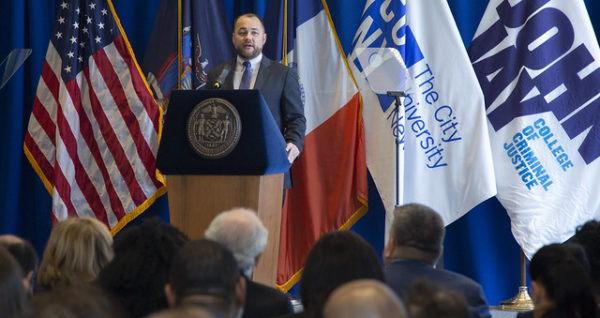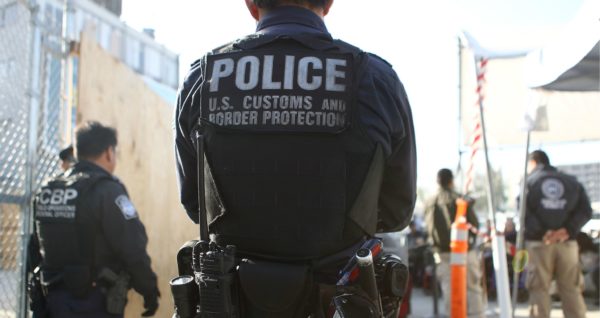At this year’s Above and Beyond Awards, Sanctuary is honoring the pro bono work of Richard Rothman, Senior Counsel at Weil, Gotshal and Manges and Co-Chair of the Incarcerated Gender Violence Survivors Initiative, Nigar Shaikh, formerly an Associate at Weil and currently Counsel at Everytown for Gun Safety, and Dori Y. Cohen, Associate at Weil, for their representation of “Amy,” an incarcerated survivor of severe domestic violence.
Vanessa Gutierrez is the 2018-2019 Tow Policy Advocacy Fellow at the Center for Battered Women’s Legal Services from John Jay College of Criminal Justice – CUNY.
—
At this year’s Above and Beyond Awards, Sanctuary is honoring the pro bono work of Richard Rothman, Senior Counsel at Weil, Gotshal and Manges and Co-Chair of the Incarcerated Gender Violence Survivors Initiative, Nigar Shaikh, formerly an Associate at Weil and currently Counsel at Everytown for Gun Safety, and Dori Y. Cohen, Associate at Weil, for their representation of “Amy,” an incarcerated survivor of severe domestic violence.
Rich Rothman has long been a pro bono advocate for survivors of gender-based violence, primarily survivors of intimate partner violence and sex trafficking. In 2017 Rich, in conjunction with Sanctuary Legal Director Dorchen Leidholdt, founded the Incarcerated Gender Violence Survivors Initiative (the “Initiative”)—a collaboration of professionals and survivors focused on three main goals:
- Representation on parole, clemency, and re-sentencing matters
- Systems-change advocacy to improve the rate of release for incarcerated survivors
- Education and training on issues related to the intersection of gender-based violence, trauma, and incarceration
Nigar Shaikh was an early member of the Initiative and was instrumental in helping the Initiative implement its three-fold strategy to assist survivors.
The Initiative strives to help survivors who have been in prison for many years. As Rich points out,
“Many of these older convictions took place in an era where domestic violence and trauma weren’t really understood by many, but especially the criminal justice system. The women we help are victims whose crimes are directly related to the abuse they suffered, which landed them in prison. These women pose no risk to society, and deserve to live their lives outside of prison.”
Amy was one of the Initiative’s first referrals. Like the vast majority of women in prison, Amy was a victim of horrific violence prior to her incarceration. She grew up witnessing domestic violence perpetrated by her father against her mother and was so distraught by what she saw that she attempted suicide at the age of twelve. A year later she moved to a new school and started dating an older boy who preyed on her vulnerability. This marked the beginning of an eleven-year relationship during which Amy was subjected to increasingly violent and dangerous abuse, as well as psychological torture. Her abuser threatened to kill her, her family, and her friends if she tried to leave him. It was right after he threatened to kill Amy’s sister, who was visiting her, that Amy made the terrifying decision to flee.
Amy and her sister were hiding at their step-mother’s house for approximately six weeks before they began to fear that her abuser had found her. During an argument with her step-mother and sister about how to stay safe now that she had been discovered, Amy’s relentless stress, terror, and untreated PTSD took over and, without conscious knowledge of what she was doing, Amy killed her step-mother, with whom she’d had a close, loving relationship. She was convicted in 1991 for murder in the second degree and sentenced to 25 years to life.
Amy was eligible for parole in 2015, but despite an impeccable record inside prison, a strong release plan, and deep remorse for the crime she committed, she was denied parole. Instead of considering the many factors that warranted her release, the parole board focused solely on the severity of the crime, completely disregarding the governing statute, regulations, and case law.
Amy was referred to the Initiative for help preparing for her next parole interview in 2018. After his first meeting with Amy at Taconic Correctional Facility, Rich knew that the Initiative had to try to help her. Soon after, he agreed to represent Amy and he recruited Nigar and Dori to complete Amy’s pro bono team.
Rich, Nigar, and Dori worked on updating and supplementing her parole packet. Understanding how important it would be to explain Amy’s extreme trauma and the effect it had on the commission of the crime, they hired a trauma expert to meet with Amy and deliver an expert report to the parole board. The team compassionately worked with Amy to prepare her for the parole board interview—an experience that is often incredibly re-traumatizing for many survivors. With the expert support and guidance of Rich, Nigar, and Dori, Amy was finally, after more than 25 years in prison, granted parole in 2018.
—
Join us at our Above & Beyond celebration on November 12, 2019, at the RUMI Event Space, 229 W 28th St, New York, NY as we honor Richard, Nigar, and Dori’s outstanding pro bono work. You can buy tickets here.
If you can’t join us, but would like to support Sanctuary for Family’s work, please consider making an Above & Beyond donation here.



